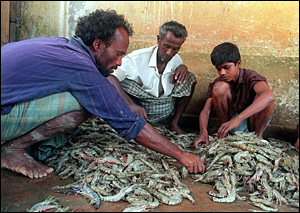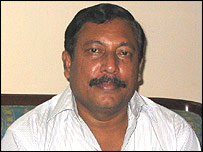 | Prawn fishermen in Chittagong, Bangladesh
MUFTY MUNIR/AFP/Getty Images |
Winners and Losers
part 1 2 3 4
Prawns in Bangladesh - continued
by Lucy Ash, BBC Current Affairs
Apart from some city-states like Hong Kong, Bangladesh is the world's most crowded nation. Nearly half the population is landless, with nowhere to live and no fields to farm.
This is the sort of place where the fry we met earlier ends up, in one of the salty rectangular shaped ponds. This shrimp farm in the middle of the coastal belt near the town of Noakhali is owned by a Mr. Al Fareed, whose name is emblazoned on a sign by the entrance. As we're driving away, about a half a mile down the road, I'm accosted by a group of people who say they used to live on the land now occupied by the farm. One woman with a small child on her hip is pointing angrily down the road.
Through our translator, the woman begins, "They did not spare me." She says that Mr. Fareed evicted her. In one night during the rainy season last year, they broke down her house. She's now sharing a house with somebody else. She says, "Where shall I get the land? They took away the land that I was cultivating over there.'"
I ask about working on the shrimp farm. Is that an option?
She says she will not accept any job. There must be respect between any two people to work and to get employment. That respect is absent.
And how does she know that it was Mr. Fareed that was responsible for evicting her from the land?
She says "muscle men" came and told her, "We're going to start a business here. Get out of here or you're going to lose your lives."
I ask the woman if she wants to leave this area.
"If I had a place to go to, I would not be suffering here," she says.
Human rights campaigners have accused big shrimp cultivators of hiring criminal gangs to intimidate traditional farmers and force them off their land. Groups that oppose shrimp farming claim that 150 people have been killed, thousands injured, and many women raped in clashes linked to prawn production. That figure is hard to verify. But since many prawn farmers use armed guards to protect their ponds, the potential for violence has certainly increased across the coastal belt of Bangladesh
 | Mohammed Fareed
courtesy BBC |
Mohammed Fareed, the owner of the farm we just visited, lives, like most absentee landlords, in the capital, Dhaka. I'm told he has another home in Saudi Arabia and that he used to run a business supplying casual workers to the Gulf States, but was later sued for deception and lost his manpower license. He flatly denies that anyone has been evicted to make way for his 800-acre shrimp farm. He insists that he's the real victim in this story.
He says, that in the summer of 2003, he was kidnapped by the landless peasants whom he refers to as bandits. And he says he asked the governments help to flush them out of his farm.
"They simply do not want me there and they want to make their home there," Fareed says. He adds that he pays 1500 taka per acre in taxes, while those "illegally occupying" the land pay no tax, "depriving the government of revenues."
At the seafood exporters fair in Dhaka recently, the Prime Minister Khaleda Zia urged the prawn industry to pay more attention to human rights and the environment.
I'm going to see the Prime Minister's chief advisor Kamal Siddiqui.
"Wherever damages are being done," says Sidikhi, "wherever people are taking law into their own hands, we are taking action against them. You see the problem is: there is a demand for shrimp and prawns in the international market. The private sector is only motivated by profit, nothing else but profit."
What will happen to the people being forced of their land by shrimp farmers?
"I'm not at all justifying these things, which are horrible things that happen," Sikikhi replies, "but it has calmed down tremendously, because of government intervention. That is what I know to be true."
No wonder he's sensitive. Almost all the shrimp produced here is for export. Most Bangladeshis can't afford to eat them. Although street stores sometimes sell the discarded heads, deep fried and coated in batter. Some pressure groups might like to ban the trade, but commercial prawn farming is clearly here to stay, especially now under new trade rules, when the country's other big export earner is threatened by cheaper Chinese garments. Many fear up to a third of textile factories here might have to close.
Is it realistic to expect one of the poorest nations to take a long-term view? Could it be persuaded to share the profits of the pink gold more fairly?
Continue to part 3
| 


